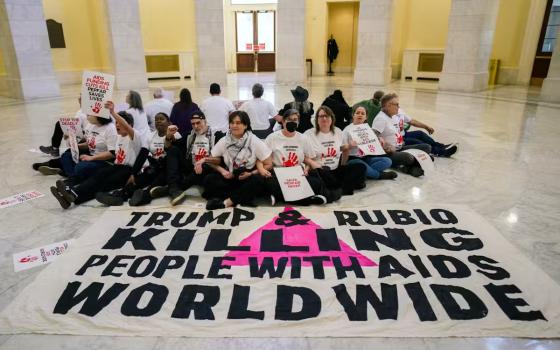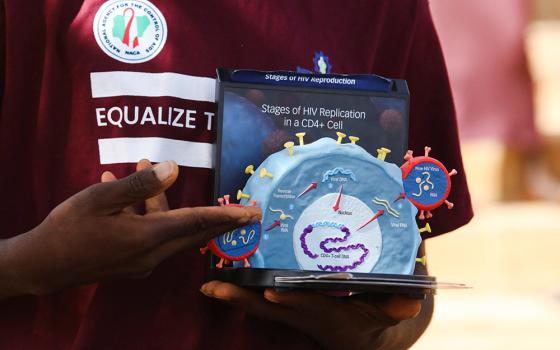
Peer educator Abraham Nnam uses a model of the HIV virus to illustrate a lesson on AIDS to youths at a primary health center in Kobi suburb, Abuja, Nigeria, Nov. 30, 2022. The future of PEPFAR, the U.S. government's global effort to combat HIV/AIDS, is unclear amid a pause on foreign assistance triggered by a Jan. 20, 2025, executive order from President Donald Trump. (OSV News/Reuters/Afolabi Sotunde)
The U.S. government's freeze on foreign aid, including funding to fight HIV and AIDS in Africa, has made Simon Bwanya, a Zimbabwean living with HIV, anxious and uncertain.
He is worried that after the U.S. government finishes its review of foreign aid funding April 19, it may ultimately stop the supply of drugs and funding for HIV programs and medicines.
He also worries the decision will cut access to crucial HIV and AIDS treatment and services in Africa.
The impact is already felt, he said, with closures of local clinics.
The halting of aid, especially for African health programs, is a constant worry for African Catholic bishops. Cardinal Stephen Brislin, archbishop of Johannesburg, South Africa, said the U.S. action under President Donald Trump is "an enormous tragedy" for Africa.
"We have always been grateful to those who give support to the sick and those battling health issues," he told the National Catholic Reporter, adding that "the great tragedy" of the recent cuts from the U.S. is that it was without warning to allow people to prepare and come up with other solutions.
"That has been terribly unfair," he said.

Women wait outside a clinic at Our Lady of Apostles Hospital in Akwanga, Nigeria, in this 2010 file photo. The rural Catholic hospital treats 1,500 patients with HIV with life-saving antiretroviral therapies. Like many such efforts, the hospital has been reliant on PEPFAR funding from the U.S. (CNS/Nancy Phelan Wiechec)
John Moffett, CEO of Misean Cara, a faith-based Irish aid group that funds health and development missionary programs in Africa, is similarly concerned about the impact of the cuts to the U.S. Agency for International Development, or USAID.
He explained that some health programs that Misean Cara was co-funding together with PEPFAR, the U.S. President's Emergency Plan for AIDS Relief, had already stopped.
"Some of our funding has been used to co-fund HIV programs together with PEPFAR in some African countries. Some of those projects, unfortunately, have had to shut down as a result of the cuts to USAID and we have been very concerned about how those programs are going to continue," Moffett said.
Describing this as a "really bad situation," Moffett bemoaned the "limited funding" that Misean Cara is able to secure from the Irish government. He was hopeful though, that "other doors" will open and enable funding into HIV and related health programs in Africa.
Advertisement
Shock and surprise
Four Zimbabweans living with HIV said in interviews that they received the news about the U.S. aid cuts announced in late January through news reports and social media and described it as a surprise and hard to accept.
Casper Pound, the director of Family AIDS Support Organization which offers HIV and AIDS support services in poor Zimbabwean communities, said the initial blanket suspension of aid by the U.S. affected people living with HIV who were getting their medication from facilities funded by the U.S.
"There was no time for planning or to make alternative arrangements to collect from other facilities such as government hospitals and clinics. It left people living with HIV in a precarious position and scrambling for solutions but making alternative plans has been difficult because of stigma," he told NCR.
"After the stop order, it was difficult for people to go back to the public facilities that they had already circumvented through opting for the U.S.-sponsored facilities. Stigma has increased and anxiety has increased because of the review that the U.S. is undertaking on funding these programs," he explained.

A notice outside a clinic Jan. 28, 2025, states that Wits RHI Key Population Program in Cape Town, South Africa, is unable to provide services until further notice following a USAID notification to pause the program. As the U.S. paused foreign assistance to countries across the world, confusion and desperation has gripped many organizations that benefit from the funds, including church-based groups. (OSV News/Reuters/Esa Alexander)
Rare ray of light
Amid the gloom, some streaks of bright light have started to emerge.
Waivers in the work stop order imposed on USAID and PEPFAR programs have started trickling in.
"It is a reprieve for us and for those we care for. Last week I received a text that we have been selected to resume services," a nurse at a facility in Harare, Zimbabwe's capital, said in late February.
But those living with HIV in Harare are still anxious about the future status of supplies. They worry that after the review, access to medication may be suspended.
African governments have tried to allay these fears, explaining that supplies are available to cover the next six months, but this has not completely quelled the anxiety.
Those living with HIV, like Bwanya, have resorted to WhatsApp groups to correct disinformation being spread due to the lack of adequate official information.
He said he regularly collects information through field visits as part of his efforts to assist members of the organization he formed called the National Network of People Living with HIV in Zimbabwe.
"There are some positives amid the gloom, anxiety and uncertainty. Nurses have started to go back to work and most of the clinics have reopened and resumed services," he said.







